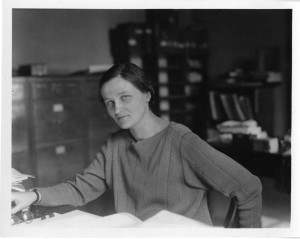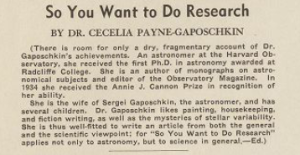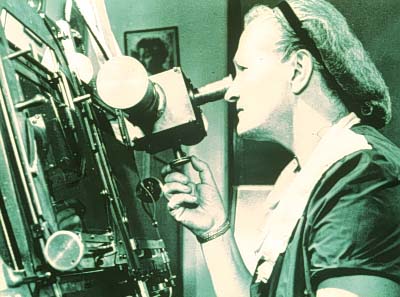 I recently came across a brief article entitled “So You Want to Do Research” in the December 1943 issue of Pro Tem, a Radcliffe College campus publication. Written by Dr. Cecilia Payne-Gaposchkin, the column offers some advice to students considering a career in research and describes some of the astronomer’s views on the process of science. Payne-Gaposchkin describes an environment that is both demanding and rewarding, and she doesn’t sugarcoat the tougher bits. Some of her advice sounds so applicable to graduate students today that it’s almost jarring to come across a sentiment or stylistic element that belongs to an earlier time, as when she consistently uses male pronouns to describe “a scholar” in the abstract. I’ve pulled out a few excerpts that spoke to me here, but the whole article is available in Harvard’s digitized collections.
I recently came across a brief article entitled “So You Want to Do Research” in the December 1943 issue of Pro Tem, a Radcliffe College campus publication. Written by Dr. Cecilia Payne-Gaposchkin, the column offers some advice to students considering a career in research and describes some of the astronomer’s views on the process of science. Payne-Gaposchkin describes an environment that is both demanding and rewarding, and she doesn’t sugarcoat the tougher bits. Some of her advice sounds so applicable to graduate students today that it’s almost jarring to come across a sentiment or stylistic element that belongs to an earlier time, as when she consistently uses male pronouns to describe “a scholar” in the abstract. I’ve pulled out a few excerpts that spoke to me here, but the whole article is available in Harvard’s digitized collections.
Only become an astronomer if nothing else will satisfy you; for nothing else is (approximately) what you will receive. The material returns will never be great, and most of the scholars who receive them do so at the price of sacrificing time that they might devote to pure scholarship. Fame is the reward of the few, and those who achieve it realize too often that it has been purchased by efforts that were not their highest. If you do your job, you will be able to earn your living, and you will taste the delights of discovery, than which (to the addict) there is nothing more satisfying. That is all. If it is enough, then become a scientist. If it is not, get out before it is too late.

Probably the most important starting points are good health, good eyesight, humility, and a sense of humor.
There are some for whom the world seems to hold no mysteries; for them, everything fits into a preconceived scheme and the whole is convincingly explained. They will never be scholars.
…a complex training, difficult to describe, yet more difficult to achieve. It involves a continuous habit of sorting the uncoordinated facts, fitting them together again and again until some pattern emerges, seeking other facts that seem to piece out the pattern. The process is one of working ceaselessly on an intellectual jigsaw puzzle, in which you have little clue to the subject, the scale of the design, the relationships of the pieces. The very elusiveness of the pattern is its chief fascination, the possibility that the final picture may prove to be of something never before seen by mortal eyes.
Astronomy is peculiar in several respects; it is a science debarred from experiment, and it deals chiefly with processes that are so slow that they defy any but long-drawn and precise observations. It is a schooling in precision and patience, and it compels the construction of long-term plans and the formulation of long-term problems.
 Lastly, there should be a word about technique. Not the detailed technique of the branch of knowledge, the particular vocabulary, symbolism, and equipment. Rather the technique of the intellectual jig-saw puzzle. Let no one expect it to be easy work. It is hard labor, often carried to the point of exhaustion and despair. Repetitions carried to the point of utter boredom. Simple, elementary processes that would shock the uninitiated by their naïveté.
Lastly, there should be a word about technique. Not the detailed technique of the branch of knowledge, the particular vocabulary, symbolism, and equipment. Rather the technique of the intellectual jig-saw puzzle. Let no one expect it to be easy work. It is hard labor, often carried to the point of exhaustion and despair. Repetitions carried to the point of utter boredom. Simple, elementary processes that would shock the uninitiated by their naïveté.
The popular conception of scientific research: ‘You must be so very clever to be able to do it’ could not be wider of the mark. Real investigation is not the reception of a transcendental vision, a process of thought beyond the power of an ordinary mortal. The prayer of the scientist might well be, “Lord, show us the obvious.”
As a science communicator, I spend a lot of time trying to convince people that you don’t have to be “so very clever” to understand or to do what scientists do on a day-to-day basis. It’s very much within “the power of an ordinary mortal,” because, well, scientists are ordinary mortals. From a historian’s perspective, it’s interesting to hear Payne-Gaposchkin’s thoughts on academic fame. It’s both conferred rather arbitrarily, and it takes up time that could be devoted to pure research. By 1943, she had already received numerous awards for her work,1 so it’s interesting to hear a somewhat cautionary note in her address to students.2 And as a former (recovering?) graduate student, I appreciate her no-punches-pulled description of the “exhaustion and despair” and “utter boredom” of research just as much as her admission that she’s an addict of the “delights of discovery.” So you want to do research? Couldn’t hurt to read this first.
- She was elected to the Royal Academy of Sciences in 1923, while still a student at Cambridge, she received the first Annie J. Cannon Award in 1934, became a member of the American Philosophical Society in 1936, and was elected to the American Academy of Arts and Sciences in 1943. ↩
- It also brings to mind the controversy over her dissertation: having found that hydrogen is by far the most abundant element in the Sun (a result contradicting prevailing theories of stellar composition), heavyweight astronomer Henry Norris Russell convinced to reject her values for hydrogen and helium abundance. Four years later in 1929, after arriving at the same conclusion using different methods, Russell published a massive paper on the subject, and although he credits Payne-Gaposchkin’s work at the end, he’s generally gotten the lion’s share of the credit. ↩

“So you want to do research? Couldn’t hurt to read this first.”
Too late; I’m already doing research and not in astronomy either, but this description was spot on.
[…] True Anomalies: “So You Want to Do Research” […]